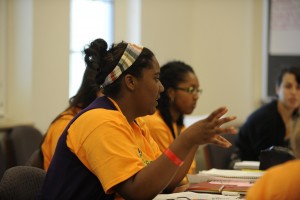Thirsty for Strong Instructional Practice?
 Discussions can be an excellent strategy for enhancing student motivation, fostering intellectual agility, and encouraging democratic habits. They create opportunities for students to practice and sharpen a number of skills, including the ability to articulate and defend positions, consider different points of view, and enlist and evaluate evidence. While discussions provide avenues for exploration and discovery, often times it is very apparent that many students do not know how to effectively and politely discuss sensitive topics. When planning a discussion, it is helpful to consider not only cognitive, but also social/emotional, and physical factors that can either foster or inhibit the productive exchange of ideas (https://www.cmu.edu/teaching/designteach/design/instructionalstrategies/discussions.html).
Discussions can be an excellent strategy for enhancing student motivation, fostering intellectual agility, and encouraging democratic habits. They create opportunities for students to practice and sharpen a number of skills, including the ability to articulate and defend positions, consider different points of view, and enlist and evaluate evidence. While discussions provide avenues for exploration and discovery, often times it is very apparent that many students do not know how to effectively and politely discuss sensitive topics. When planning a discussion, it is helpful to consider not only cognitive, but also social/emotional, and physical factors that can either foster or inhibit the productive exchange of ideas (https://www.cmu.edu/teaching/designteach/design/instructionalstrategies/discussions.html).
Take a SIP of This: Classroom Discussions
- One of the first activities you may wish to consider for the semester is a small-group exploration of what helps students feel safe when discussing sensitive topics related to identity, culture, race, gender, religion, socioeconomic status, disability, etc. After small-group brainstorming, bring the class together as a large group to share responses and to determine, collectively, the specific behaviors, communication styles, and verbal and nonverbal cues that will help class members feel safe in discussions throughout the course. These can be written down and distributed to serve as a guide or reminder throughout the course.
- Other recommendations for establishing safety in the classroom are to create a safe and supportive environment, by making group agreements at the beginning of the year. These might include guidelines like “no name-calling,” “no interrupting,” “listen without judgment,” “share to your level of comfort,” “you have the right to pass.”
- Remind students that when they talk about groups of people, they should be careful to use the word “some,” not “all.”
- Do community-building activities to create a positive and respectful classroom environment, and resolve conflicts proactively.
- Most importantly, model how to talk about sensitive topics by being honest and open yourself and by being respectful and even-handed with different points of view.
